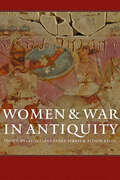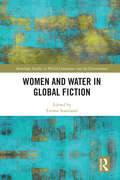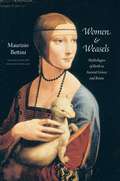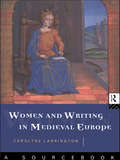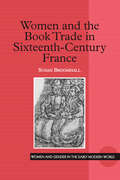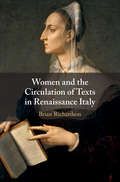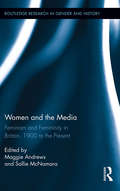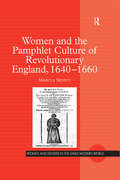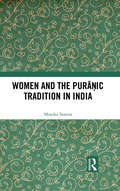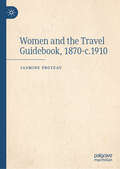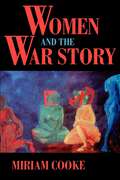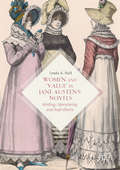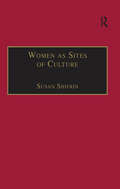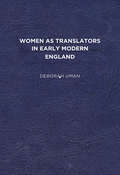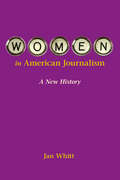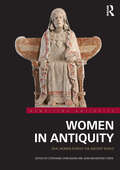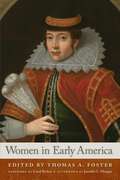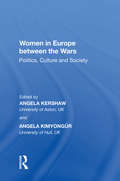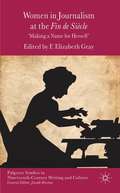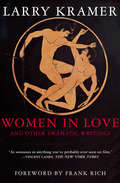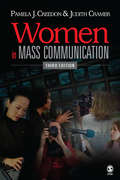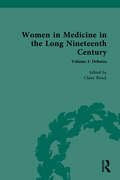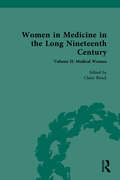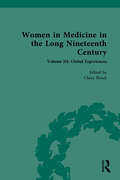- Table View
- List View
Women and War in Antiquity
by Jacqueline Fabre-Serris and Alison KeithWomen in ancient Greece and Rome played a much more active role in battle than previously assumed.The martial virtues—courage, loyalty, cunning, and strength—were central to male identity in the ancient world, and antique literature is replete with depictions of men cultivating and exercising these virtues on the battlefield. In Women and War in Antiquity, sixteen scholars reexamine classical sources to uncover the complex but hitherto unexplored relationship between women and war in ancient Greece and Rome. They reveal that women played a much more active role in battle than previously assumed, embodying martial virtues in both real and mythological combat.The essays in the collection, taken from the first meeting of the European Research Network on Gender Studies in Antiquity, approach the topic from philological, historical, and material culture perspectives. The contributors examine discussions of women and war in works that span the ancient canon, from Homer’s epics and the major tragedies in Greece to Seneca’s stoic writings in first-century Rome. They consider a vast panorama of scenes in which women are portrayed as spectators, critics, victims, causes, and beneficiaries of war.This deft volume, which ultimately challenges the conventional scholarly opposition of standards of masculinity and femininity, will appeal to scholars and students of the classical world, European warfare, and gender studies.
Women and Water in Global Fiction (Routledge Studies in World Literatures and the Environment)
by Emma StanilandSymbols and tropes of liquidity have long been connected to notions of the feminine and, therefore, with orthodox constructions of femininity and womanhood. Underpinning these ideas is the vital importance of water as life force, which has given it a central place in cultural vocabularies worldwide. These symbolic economies, in turn, inform the discourses through which positive or negative associations of women with water come to bear impact on the social positioning of female gendered identities. Women and Water in Global Fiction brings together an array of studies of this phenomenon as seen in writing by and about women from around the world. The literature explored in this volume works to make visible, decodify, celebrate, and challenge the cultural associations made between female gendered identities and all kinds of watery tropes, as well as their consequences for key issues connected to women, society, and the environment. The collection investigates the roots of such symbolisms, examines how they inform women’s place in the socio-cultural orders of diverse global cultures, and shows how the female authors in question use these tropes in their work as ways of (re)articulating female identities and their correlative roles.
Women and Weasels: Mythologies of Birth in Ancient Greece and Rome
by Maurizio BettiniIf you told a woman her sex had a shared, long-lived history with weasels, she might deck you. But those familiar with mythology know better: that the connection between women and weasels is an ancient and favorable one, based in the Greek myth of a midwife who tricked the gods to ease Heracles’s birth—and was turned into a weasel by Hera as punishment. Following this story as it is retold over centuries in literature and art, Women and Weasels takes us on a journey through mythology and ancient belief, revising our understanding of myth, heroism, and the status of women and animals in Western culture. Maurizio Bettini recounts and analyzes a variety of key literary and visual moments that highlight the weasel’s many attributes. We learn of its legendary sexual and childbearing habits and symbolic association with witchcraft and midwifery, its role as a domestic pet favored by women, and its ability to slip in and out of tight spaces. The weasel, Bettini reveals, is present at many unexpected moments in human history, assisting women in labor and thwarting enemies who might plot their ruin. With a parade of symbolic associations between weasels and women—witches, prostitutes, midwives, sisters-in-law, brides, mothers, and heroes—Bettini brings to life one of the most venerable and enduring myths of Western culture.
Women and Writing in Medieval Europe: A Sourcebook
by Carolyne LarringtonCarolyne Larrington has gathered together a uniquely comprehensive collection of writing by, for and about medieval women, spanning one thousand years and Europe from Iceland to Byzantiu. The extracts are arranged thematically, dealing with the central areas of medieval women's lives and their relation to social and cultural institutions. Each section is contextualised with a brief historical introduction, and the materials span literary, historical, theological and other narrative and imaginative writing. The writings here uncover and confound the stereotype of the medieval woman as lady or virgin by demonstrating the different roles and meanings that the sign of woman occupied in the imaginative space of the medieval period.Larrington's clear and accessible editorial material and the modern English translations of all the extracts mean this work is ideally suited for students. Women and Writing in Early Europe: A Sourcebook also contains an extensive and fully up-to-date bibliography, making it not only essential reading for undergraduates and post graduates but also a valuable tool for scholars.
Women and the Book Trade in Sixteenth-Century France (Women and Gender in the Early Modern World)
by Susan BroomhallFocusing on the vastly understudied area of how women participated in the book trades, not just as authors, but also as patrons, copyists, illuminators, publishers, editors and readers, Women and the Book Trade in Sixteenth-Century France foregrounds contributions made by women during a period of profound transformation in the modes and understanding of publication. Broomhall asks whether women's experiences as authors changed when manuscript circulation gave way to the printed book as a standard form of publication. Innovatively, she broadens the concept of publication to include methods of scribal publication, through the circulation and presentation of manuscripts, and expands notions of authorship to incorporate a wide sample group of female writers and publishing experiences. She challenges the existing view that manuscript offered a "safe" means of semi-public exposure for female authors and explores its continuing presence after the introduction of print. The study introduces a wide and rich range of unexamined sources on early modern women, using an extensive range of manuscripts and the entire corpus of women's printed texts in sixteenth-century France. Most of the original texts, uncovered during the author's own extensive archival and bibliographical research, have never been re-published in modern French. Most of the citations from them are here translated into English for the first time. The work presents the only checklist of all known women's writings in printed texts, from prefaces and laudatory verse to editions of prose and poetry, between 1488 and 1599. Women and the Book Trade in Sixteenth-Century France constitutes the most comprehensive assessment of women's contribution to contemporary publishing yet available. Broomhall's innovative approach and her conclusions have relevance not only for book historians and French historians, but for a broad range of scholars who work with other European literatures and histories, as well as women's studies.
Women and the Circulation of Texts in Renaissance Italy
by Brian RichardsonDuring the Italian Renaissance, laywomen and nuns could take part in every stage of the circulation of texts of many kinds, old and new, learned and popular. This first in-depth and integrated analysis of Italian women's involvement in the material textual culture of the period shows how they could publish their own works in manuscript and print and how they promoted the first publication of works composed by others, acting as patrons or dedicatees. It describes how they copied manuscripts and helped to make and sell printed books in collaboration with men, how they received books as gifts and borrowed or bought them, how they commissioned manuscripts for themselves and how they might listen to works in spoken or sung performance. Brian Richardson's richly documented study demonstrates the powerful social function of books in the Renaissance: texts-in-motion helped to shape women's lives and sustain their social and spiritual communities.
Women and the Media: Feminism and Femininity in Britain, 1900 to the Present (Routledge Research in Gender and History #18)
by Maggie Andrews Sallie McNamaraThe media have played a significant role in the contested and changing social position of women in Britain since the 1900s. They have facilitated feminism by both providing discourses and images from which women can construct their identities, and offering spaces where hegemonic ideas of femininity can be reworked. This volume is intended to provide an overview of work on Broadcasting, Film and Print Media from 1900, while appealing to scholars of History and Media, Film and Cultural Studies. This edited collection features tightly focused and historically contextualised case studies which showcase current research on women and media in Britain since the 1900s. The case studies explore media directed at a particularly female audience such as Woman’s Hour, and magazines such as Vogue, Woman and Marie Claire. Women who work in the media, issues of production, and regulation are discussed alongside the representation of women across a broad range of media from early 20th-century motorcycling magazines, Page 3 and regional television news.
Women and the Pamphlet Culture of Revolutionary England, 1640-1660 (Women and Gender in the Early Modern World)
by Marcus NevittOffering an analysis of the ways in which groups of non-aristocratic women circumvented a number of interdictions against female participation in the pamphlet culture of revolutionary England, this book is primarily a study of female agency. Despite the fact that pamphlets, or cheap unbound books, have recently been located among the most inclusive or democratic aspects of the social life of early modern England, this study provides a more gender-sensitive picture. Marcus Nevitt argues instead that throughout the revolutionary decades pamphlet culture was actually constructed around the public silence and exclusion of women. In support of his thesis, he discusses more familiar seventeenth-century authors such as John Milton, John Selden and Thomas Edwards in relation to the less canonical but equally forceful writings of Katherine Chidley, Elizabeth Poole, Mary Pope, 'Parliament Joan' and a large number of Quaker women. This is the first sustained study of the relationship between female agency and cheap print throughout the revolutionary decades 1640 to 1660. It adds to the study of gender in the field of the English Revolution by engaging with recent work in the history of the book, stressing the materiality of texts and the means and physical processes by which women's writing emerged through the printing press and networks of publication and dissemination. It will stimulate welcome debate about the nature and limits of discursive freedom in the early modern period, and for women in particular.
Women and the Puranic Tradition in India
by Monika SaxenaThis book analyses the diverse ways in which women have been represented in the Purāṇic traditions in ancient India – the virtuous wife, mother, daughter, widow, and prostitute – against the socio-religious milieu around CE 300–1000. Purāṇas (lit. ancient narratives) are brahmanical texts that largely fall under the category of socio-religious literature which were more broad-based and inclusive, unlike the Smṛtis, which were accessible mainly to the upper sections of society. In locating, identifying, and commenting on the multiplicity of the images and depictions of women’s roles in Purāṇic traditions, the author highlights their lives and experiences over time, both within and outside the traditional confines of the domestic sphere. With a focus on five Mahāpurāṇas that deal extensively with the social matrix Viṣṇu, Mārkaṇḍeya Matsya, Agni, and Bhāgavata Purāṇas, the book explores the question of gender and agency in early India and shows how such identities were recast, invented, shaped, constructed, replicated, stereotyped, and sometimes reversed through narratives. Further, it traces social consequences and contemporary relevance of such representations in marriage, adultery, ritual, devotion, worship, fasts, and pilgrimage. This volume will be of interest to researchers and scholars in women and gender studies, ancient Indian history, religion, sociology, literature, and South Asian studies, as also the informed general reader.
Women and the Travel Guidebook, 1870-c.1910
by Jasmine ProteauAlthough the printing giants of John Murray and Karl Baedeker dominated the nineteenth-century travel guidebook market, women were important producers and consumers of guides. This book argues that in the late nineteenth century, women were key cultural producers of travel guidebooks, an important form of non-fiction mass media, during an upsurge and shift in European travel and tourism. While a limited number of studies have identified a small number of female-authored guidebooks, this is the first to take a broad view of women’s place within the guidebook market, situating female-authored texts within a large and competitive book market to understand the role of gender in guidebook publication. Given Italy’s historic religious, cultural, and artistic significance to the Anglophone world, guides to Italy were perhaps the most numerous among all the guidebooks targeted at travellers from the United Kingdom and North America in the nineteenth-century and therefore form a key focus of this study.
Women and the War Story
by Miriam CookeIn a book that radically and fundamentally revises the way we think about war, Miriam Cooke charts the emerging tradition of women's contributions to what she calls the "War Story," a genre formerly reserved for men. Concentrating on the contemporary literature of the Arab world, Cooke looks at how alternatives to the master narrative challenge the authority of experience and the permission to write. She shows how women who write themselves and their experiences into the War Story undo the masculine contract with violence, sexuality, and glory. There is no single War Story, Cooke concludes; the standard narrative—and with it the way we think about and conduct war—can be changed.As the traditional time, space, organization, and representation of war have shifted, so have ways of describing it. As drug wars, civil wars, gang wars, and ideological wars have moved into neighborhoods and homes, the line between combat zones and safe zones has blurred. Cooke shows how women's stories contest the acceptance of a dyadically structured world and break down the easy oppositions—home vs. front, civilian vs. combatant, war vs. peace, victory vs. defeat—that have framed, and ultimately promoted, war.
Women and ‘Value’ in Jane Austen’s Novels: Settling, Speculating and Superfluity
by Lynda A. HallJane Austen’s minor female characters expose the economic and social realties of British women in the long eighteenth century and reflect the conflict between intrinsic and expressed value within the evolving marketplace, where fluctuations and fictions inherent in the economic and moral value structures are exposed. Just as the newly-minted paper money was struggling to express its value, so do Austen’s minor female characters struggle to assert their intrinsic value within a marketplace that expresses their worth as bearers of dowries. Austen’s minor female characters expose the plight of women who settle for transactional marriages, become speculators and predators, or become superfluous women who have left the marriage market and battle for personal significance and existence. These characters illustrate the ambiguity of value within the marriage market economy, exposing women’s limited choices. This book employs a socio-historical framework, considering the rise of a competitive consumer economy juxtaposed with affective individualism.
Women as Sites of Culture: Women's Roles in Cultural Formation from the Renaissance to the Twentieth Century
by Susan ShifrinExploring the ways in which women have formed and defined expressions of culture in a range of geographical, political, and historical settings, this collection of essays examines women's figurative and literal roles as "sites" of culture from the 16th century to the present day. The diversity of chronological, geographical and cultural subjects investigated by the contributors-from the 16th century to the 20th, from Renaissance Italy to Puritan Boston to the Polish-Lithuanian Commonwealth to post-war Japan, from parliamentary politics to the politics of representation-provides a range of historical outlooks. The collection brings an unusual variety of methodological approaches to the project of discovering intersections among women's studies, literary studies, cultural studies, history, and art history, and expands beyond the Anglo- and Eurocentric focus often found in other works in the field. The volume presents an in-depth, investigative study of a tightly-constructed set of crucial themes, including that of the female body as a governing trope in political and cultural discourses; the roles played by women and notions of womanhood in redefining traditions of ceremony, theatricality and spectacle; women's iconographies and personal spaces as resources that have shaped cultural transactions and evolutions; and finally, women's voices-speaking and writing, both-as authors of cultural record and destiny. Throughout the volume the themes are refracted chronologically, geographically, and disciplinarily as a means to deeper understanding of their content and contexts. Women as Sites of Culture represents a productive collaboration of historians from various disciplines in coherently addressing issues revolving around the roles of gender, text, and image in a range of cultures and periods.
Women as Translators in Early Modern England
by Deborah UmanWomen as Translators in Early Modern England offers a feminist theory of translation that considers both the practice and representation of translation in works penned by early modern women. It argues for the importance of such a theory in changing how we value women’s work. Because of England’s formal split from the Catholic Church and the concomitant elevation of the written vernacular, the early modern period presents a rich case study for such a theory. This era witnessed not only a keen interest in reviving the literary glories of the past, but also a growing commitment to humanist education, increasing literacy rates among women and laypeople, and emerging articulations of national sentiment. Moreover, the period saw a shift in views of authorship, in what it might mean for individuals to seek fame or profit through writing. Until relatively recently in early modern scholarship, women were understood as excluded from achieving authorial status for a number of reasons—their limited education, the belief that public writing was particularly scandalous for women, and the implicit rule that they should adhere to the holy trinity of “chastity, silence, and obedience.” While this view has changed significantly, women writers are still understood, however grudgingly, as marginal to the literary culture of the time. Fewer women than men wrote, they wrote less, and their “choice” of genres seems somewhat impoverished; add to this the debate over translation as a potential vehicle of literary expression and we can see why early modern women’s writings are still undervalued. This book looks at how female translators represent themselves and their work, revealing a general pattern in which translation reflects the limitations women faced as writers while simultaneously giving them the opportunity to transcend these limitations. Indeed, translation gave women the chance to assume an authorial role, a role that by legal and cultural standards should have been denied to them, a role that gave them ownership of their words and the chance to achieve profit, fame, status and influence. Published by University of Delaware Press. Distributed worldwide by Rutgers University Press.
Women in American Journalism: A New History
by Jan WhittIn this volume, Jan Whitt tells the stories of women who have been overlooked in journalism history, offering an important corrective to scholarship that narrowly focuses on the deeds of men like Joseph Pulitzer and William Randolph Hearst. She shows how numerous women broadened the editorial scope of newspapers and journals, transformed women’s professional roles, used journalism as a training ground for major literary works, and led breakthroughs in lesbian and alternative presses. Whitt explores the lives of women reporters who achieved significant historical recognition, such as Ida Tarbell and Ida Wells-Barnett. Investigating the often blurry boundary between journalism and literature, she explains how this fluid distinction has actually limited how many scholars perceive the contributions of authors such as Joan Didion and Susan Orlean. Whitt also highlights the work of important novelists, including Willa Cather, Katherine Anne Porter, and Eudora Welty, to shed light on how their work as journalists informed their highly successful fiction. This study also offers a survey of contributions women have made to the alternative presses, including the environmental press and civil rights activism. Whitt examines important figures in the early feminist press such as Caroline Churchill, editor and reporter for Denver’s Queen Bee, and Betty Wilkins of Kansas City’s Call. Finally, through newsletters, newspapers, magazines, and journals, she traces the history of the lesbian press and points out the ways in which it indicates that the alternative press is thriving.
Women in Antiquity: Real Women across the Ancient World (Rewriting Antiquity)
by Jean Macintosh Turfa Stephanie Lynn BudinThis volume gathers brand new essays from some of the most respected scholars of ancient history, archaeology, and physical anthropology to create an engaging overview of the lives of women in antiquity. The book is divided into ten sections, nine focusing on a particular area, and also includes almost 200 images, maps, and charts. The sections cover Mesopotamia, Egypt, Anatolia, Cyprus, the Levant, the Aegean, Italy, and Western Europe, and include many lesser-known cultures such as the Celts, Iberia, Carthage, the Black Sea region, and Scandinavia. Women's experiences are explored, from ordinary daily life to religious ritual and practice, to motherhood, childbirth, sex, and building a career. Forensic evidence is also treated for the actual bodies of ancient women. Women in Antiquity is edited by two experts in the field, and is an invaluable resource to students of the ancient world, gender studies, and women's roles throughout history.
Women in Early America
by Carol Berkin Jennifer L Morgan Thomas A FosterThe fascinating stories of the myriad women who shaped the early modern North American world from the colonial era through the first years of the Republic.Women in Early America goes beyond the familiar stories of Pocahontas or Abigail Adams, recovering the lives and experiences of lesser-known women―both ordinary and elite, enslaved and free, Indigenous and immigrant―who lived and worked in not only British mainland America, but also New Spain, New France, New Netherlands, and the West Indies. In these essays we learn about the conditions that women faced during the Salem witchcraft panic and the Spanish Inquisition in New Mexico; as indentured servants in early Virginia and Maryland; caught up between warring British and Native Americans; as traders in New Netherlands and Detroit; as slave owners in Jamaica; as Loyalist women during the American Revolution; enslaved in the President&’s house; and as students and educators inspired by the air of equality in the young nation. The contributors showcase new research and analysis informed by feminist theory, gender theory, new cultural history, social history, and literary criticism. Women in Early America heeds the call of feminist scholars to not merely reproduce male-centered narratives, &“add women, and stir,&” but to rethink master narratives themselves so that we may better understand how women and men created and developed our historical past.
Women in Europe between the Wars: Politics, Culture and Society
by Angela KimyongürThe central aim of this interdisciplinary book is to make visible the intentionality behind the 'forgetting' of European women's contributions during the period between the two world wars in the context of politics, culture and society. It also seeks to record and analyse women's agency in the construction and reconstruction of Europe and its nation states after the First World War, and thus to articulate ways in which the writing of women's history necessarily entails the rewriting of everyone's history. By showing that the erasure of women's texts from literary and cultural history was not accidental but was ideologically motivated, the essays explicitly and implicitly contribute to debates surrounding canon formation. Other important topics are women's political activism during the period, antifascism, the contributions made by female journalists, the politics of literary production, genre, women's relationship with and contributions to the avant-garde, women's professional lives, and women's involvement in voluntary associations. In bringing together the work of scholars whose fields of expertise are diverse but whose interests converge on the inter-war period, the volume invites readers to make connections and comparisons across the whole spectrum of women's political, social, and cultural activities throughout Europe.
Women in Independent Publishing: A History of Unsung Innovators, 1953-1989
by Stephanie AndersonWomen in Independent Publishing is a collection of interviews with and resources about women actively engaged in small-press publishing between the 1950s and the 1980s. The interviewees include Hettie Jones, Margaret Randall, Bernadette Mayer, and many others.The scope and range of the interviews showcase a variety of types of publishing possible within the small press community. These interviews illuminate the unifying and diverging elements between multiple publishing “scenes” and reveal their particularities and commonalities. Women in Independent Publishing is a timely and urgent documentation of literary history and reveals and celebrates the multifaceted roles of women editors and publishers and the communities they built.The book includes a critical introduction, an afterword by contemporary small-press publisher M. C. Hyland and a robust resources section that provides further paths for reading and literary recovery.
Women in Journalism at the Fin de Stècle: Making a Name for Herself (Palgrave Studies in Nineteenth-Century Writing and Culture)
by F. Elizabeth GrayAs the nineteenth-century drew to a close, women became more numerous and prominent in British journalism. This book offers a fascinating introduction to the work lives of twelve such journalists, and each essay examines the career, writing and strategic choices of women battling against the odds to secure recognition in a male-dominated society.
Women in Love: And Other Dramatic Writings (Books That Changed the World)
by Larry KramerScreenplays and scripts from the playwright of The Normal Heart.&“A valuable showcase of an important writer&’s early career.&”—The Bay Area Reporter Larry Kramer has been described by Susan Sontag as &“one of America&’s most valuable troublemakers.&” As Frank Rich writes in his Foreword to this collection of writings for the screen and stage, &“his plays are almost journalistic in their observation of the fine-grained documentary details of life . . . that may well prove timeless.&” The title work, the Oscar-nominated screenplay for Women in Love, is a movie &“as sensuous as anything you&’ve probably ever seen on film&” (The New York Times). The screenplay is accompanied by Kramer&’s reflections on the history of the production, sure to be of interest to any student of film. This volume also includes several early plays, Sissies&’ Scrapbook, A Minor Dark Age, and the political farce Just Say No, illuminating the development of one of our most important literary figures. &“Since his screenplay for Women in Love, Kramer has been a prophet of psychic health and catastrophe among us.&” (from The American Academy of Arts and Letters citation). Women in Love &“A visual stunner and very likely the most sensual film ever made.&”—New York Daily News &“Throughout Larry Kramer&’s literate scenario, the Lawrentian themes blaze and gutter. The sooty mind-crushing coal mines that Lawrence knew like the back of his hand are re-created in all their malignance. The annealing quality of sex is exhibited in the most erotic—and tasteful—lust scenes anywhere in contemporary film.&”—Time
Women in Mass Communication
by Dr Pamela J. Creedon Judith CramerThe Third Edition of Women in Mass Communication provides a new generation of students with an insightful examination of women in the journalism and mass communication professions. In this seminal volume, editors Pamela Creedon and Judith Cramer offer ideas and directions for improving the status of women—and men— working in the field.
Women in Medicine in the Long Nineteenth Century: Volume I: Debates (Nineteenth-Century Science, Technology and Medicine: Sources and Documents)
by Claire BrockThe volume explores the range of reactions to medical women from the mid-nineteenth century up until the start of the Great War in 1914. By covering this period, readers will be introduced to ongoing debates surrounding women in medicine, via sources which explore the possibilities for – as well as the problems of – female professional practice. The perspectives of detractors and supporters, as well as medical women themselves, are taken into account, and especial consideration given to opinions which were not neatly divided along gender lines. Of key concern here is a nuanced tracing through primary material of changes in the perception of medical women, as well as the ways in which lingering prejudices disappeared or remained well into the twentieth century. This volume focuses on two key areas: first, the debates and challenges around medical and surgical education for women; and, second, women’s physical and mental ‘fitness’ to practise. The reproduction of previously unpublished student magazines, both from the foundational London School of Medicine for Women, as well as medical schools which considered admitting women during this period, are an original feature of this volume. Accompanied by extensive editorial commentary, this title will be of great interest to students of Women's History and the History of Medicine.
Women in Medicine in the Long Nineteenth Century: Volume II: Medical Women (Nineteenth-Century Science, Technology and Medicine: Sources and Documents)
by Claire BrockAs an exciting, challenging, and for some, repulsive, novelty and phenomenon, the medical woman was fictionalised swiftly in the second half of the nineteenth century. This volume reproduces literary examples which explore the many facets of women’s entry into the medical profession, and their experiences once qualified. This volume broadens literary and cultural understanding of female doctors through the selection of sources which are less well-known or more difficult to find, as well as considering global examples or contexts. By including sources which reveal both supportive and derogatory assessments, and by male and female authors, a wide range of opinions regarding women’s efficacy as medical practitioners are considered. Accompanied by extensive editorial commentary, this title will be of great interest to students of Women's History and the History of Medicine.
Women in Medicine in the Long Nineteenth Century: Volume III: Global Experiences (Nineteenth-Century Science, Technology and Medicine: Sources and Documents)
by Claire BrockThis volume explores medical women as a global phenomenon during the long nineteenth century. The volume considers, firstly, how especially British medical women travelled internationally to treat patients who, for reasons of religious, cultural, or social beliefs, were reluctant to seek treatment from male doctors. In this instance, missionary zeal was balanced with concern for women’s health and welfare. Secondly, the volume includes texts written by those who qualified as medical women and practised either in their national context or those educated abroad, who then returned home to pursue their careers. The latter makes more widely available works by women of colour, including, for example, the African American woman doctor, Rebecca Lee Crumpler, and Indian female medical practitioner, Rukhmabai. Accompanied by extensive editorial commentary, this title will be of great interest to students of Women's History and the History of Medicine.
